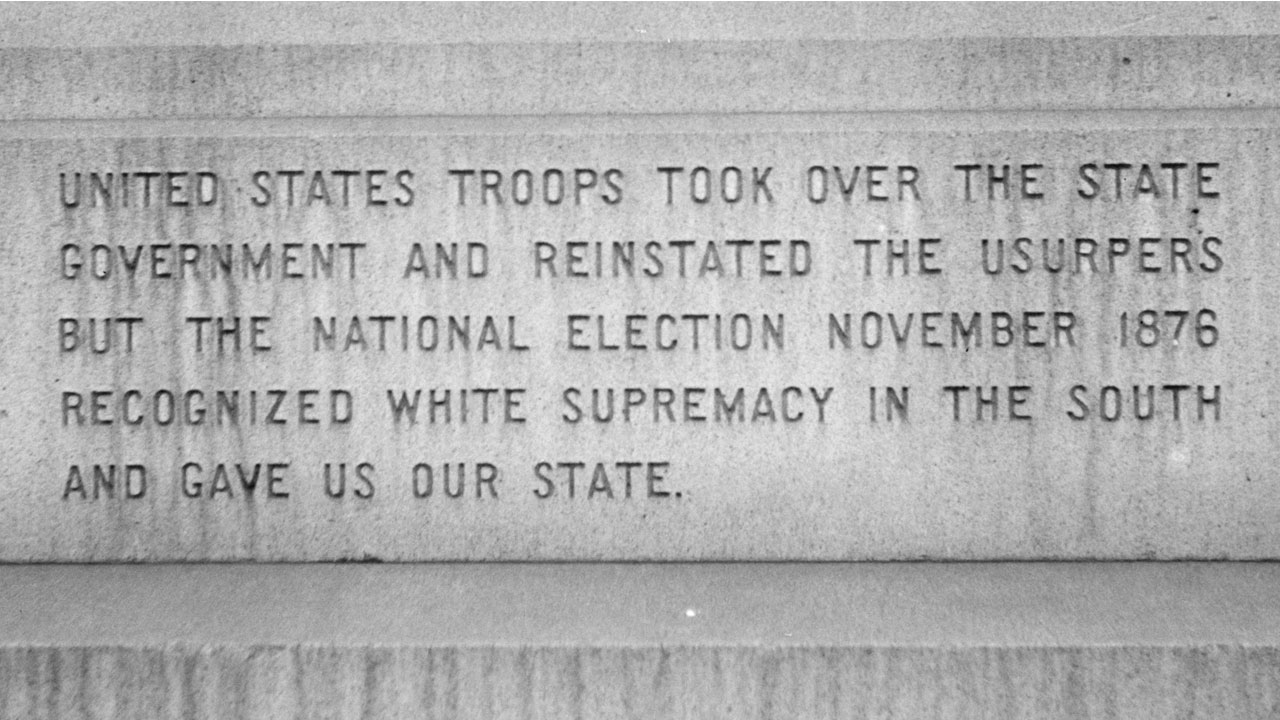Each side of the Revolution and the Civil War believed they were right, also the main issue of the Civil War was not about slavery it was secondary. We have
distorted the reason for the Civil War and are trying to rewrite all of history over it.
Then it's kind of inconvenient that every seceding state specifically cited Slavery, AT THE TIME, as a basis for leaving the Union, isn't it.
See, this malarkey about "it wasn't about Slavery" is part and parcel of the Lost Cause Cult revisionism, which is what those monuments were executing as well. The effect of the UDC Ministry of Propaganda.
Ah, the quoted poster "disagrees" but has no response to prove me wrong. Because I'm right.
>> Although they mentioned other causes and sometimes used veiled references to defense of “life and property,” none of the secessionist was [sic] shy about making some reference to slavery as a primary cause for their dissolution of ties with a United States government that had, in their eyes, fallen under the domination of the “Black Republicans,” as a careful look through their respective ordinances will reveal.
The attitudes of the time can be found in more detail in the rhetoric that accompanied the breaks. At the very onset, on December 20, 1860, South Carolina declared that President-elect Abraham Lincoln’s “opinions and purposes are hostile to slavery.”
On January 7, 1861, the ordinance signed in Montgomery that “it is the desire and purpose of the people of Alabama to meet the Slaveholding States of the South, who may approve such purpose, in order to frame a provisional as well as permanent government upon the principles of the Constitution of the United States.”
On February 2, 1861, Texas declared its decision to be “based upon the unnatural feeling of hostility to these Southern States and their beneficent and patriarchal system of African slavery, proclaiming the debasing doctrine of equality of all men, irrespective of race or color—a doctrine at war with nature, in opposition to the experience of mankind, and in violation of the plainest revelations of the Divine Law.”
On March 9, 1861, Arkansas’s George B. Smoote added a resolution: “Resolved, that the platform on the party known as the Black Republican Party contains unconstitutional dogmas, dangerous in their tendency and highly derogatory to the rights of slave states, and among them the insulting, injurious and untruthful enunciation of the right of the African race of their country to social and political equality with the whites.”
On April 17, 1861 latecomer Virginia, provoked by Lincoln’s raising troops to suppress the already seceded states, declared “Lincoln’s opinions and purposes are
hostile to slavery” as it cut ties with Washington. Tennessee was the 11th and last, its population divided on secession (eastern Tennesseans generally opposed it), but not on the slave issue. << ---
History.net
It's
recorded, dood.
In writing. In 1860 and 1861.
Meanwhile the propaganda you bought from the UDC, and their monuments, is this:
>> The
Lost Cause of the Confederacy, or simply the
Lost Cause, is an
American pseudo-historical,
[1][2] negationist ideology that advocates the belief that the cause of the
Confederate States during the
American Civil War was a just and heroic one.
[3] This ideology has furthered the belief that
slavery was just and moral, because the enslaved were happy, even grateful, and it also
brought economic prosperity. The notion was used to perpetuate
racism and racist power structures during the
Jim Crow era in the
American South.
[4] It emphasizes the supposed chivalric virtues of the
antebellum South. It thus views the war as a struggle primarily waged to save the
Southern way of life[5] and to protect "
states' rights", especially the right to
secede from the Union. It casts that attempt as faced with "overwhelming
Northern aggression". At the same time, it minimizes or completely denies the central role of slavery and
white supremacy in the build-up to, and outbreak of, the war.
[4]
... Though the idea of the Lost Cause has more than one origin, its proponents mainly argue that slavery was not the
primary cause of the Civil War.
[10] In reaching that conclusion, they ignore the declarations of secession by the Confederate states, the declarations of congressmen who left the US Congress to join the Confederacy, and the treatment of slavery in the
Confederate Constitution.
[11] They also deny or minimize the wartime writings and speeches of Confederate leaders, such as CSA Vice President Alexander Stephens's
Cornerstone Speech, instead favoring the leaders' postwar views.
[12] << (
Wiki)
Wanna see that "Cornerstone Speech"? Here's the relevant passage:
>> ts foundations are laid, its cornerstone rests upon the great truth, that the negro is not equal to the white man; that
slavery—subordination to the superior race—is his natural and normal condition. This, our new government, is the first, in the history of the world, based upon this great physical, philosophical, and moral truth.
[2]
Our confederacy is founded upon principles in strict conformity with these laws. This stone which was rejected by the first builders "is become the chief of the corner"—the real "corner-stone"—in our new edifice.
[1] << (March 21, 1861 by Alexander Stephens, VP of the CSA)
I'm afraid these are recorded quotes. You don't get to "disagree" that they exist.



